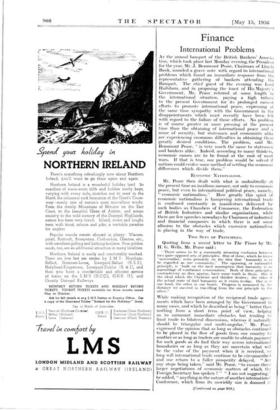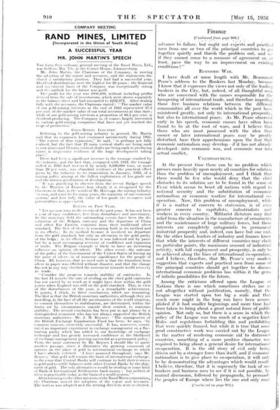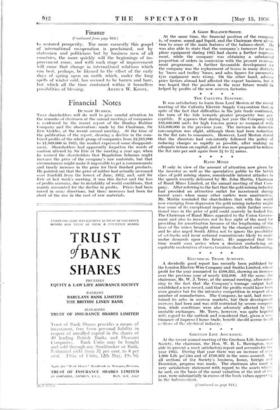International Problems
Finance
AT the annual banquet of the British Bankers' Associa- tion, which took place last Monday evening, the President for the year, Mr. J. Beaumont Pease, Chairman of Lloyds Bank, sounded a grave note with regard to international problems which found an immediate response front the representative gathering of bankers attending the Banquet. The chief guest of the evening was Lord Hailsham, and in proposing the toast of His Majesty's Government, Mr. Pease referred at some length to the international situation, paying a high tribute to the present Government for its prolonged earnest efforts to promote international peace, expressing at the same time sympathy with the Government in the disappointments which must recently have been felt with regard to the failure of those efforts. No problem is of course greater or more pressing at the present time than the obtaining of international peace and a sense of security, but statesmen and economists alike are experiencing enormous difficulties in obtaining these greatly desired conditions: The problem, said Mr. Beaumont Pease, " is very much the same to statesmen and bankers alike. Indeed, according to many thinkers, economic causes are to be found at the root of most wars. If that is true, our problem would be solved if nations could evolve some method of settling the economic differences which divide them."
ECONOMIC NATIONALISM.
Mr. Pease then dealt with what is undoubtedly at the present time an insidious menace, not only to economic peace, but even to international political peace, namely, " economic nationalism." How greatly this spirit of economic nationalism is hampering international trade is confessed constantly in manifestoes delivered by such bodies as Chambers of Commerce, the Federation of British Industries and similar organisations, while there are few speeches nowadays by Chairmen of industrial and financial companies in which there is not some allusion to the obstacles which excessive nationalism is placing in the way of trade.
Two SETS OF PRINCIPLES.
Quoting from a recent letter to The Times by Mr. H. G. Wells, Mr. Pease said : There seems to be a constantly recurring confusion between two quite opposed sets of principles. One of these, which he terms ' universalist, rests primarily on the idea that humanity is to be regarded as one community.' The opposing, or nationalist principle, is built on the tacit assumption that humanity is an assemblage of combatant communities.' Both of these principles, contradictory as they appear, have some truth in them. One is the ideal which the Christian and thinker desires ; the other is the actual state of frail humanity as it exists to-day. One is in our head, the other in our bones. Progress is measured by the distance we succeed in travelling from the one principle to the other."
While making recognition of the reciprocal trade agree- ments which have been arranged by the Government in many cases, and which he described as being " better than nothing from a short term point of view, helping us to surmount immediate obstacles but tending to limit trade to bilateral dimensions, whereas it naturally should be triangular and multi-angular," Mr. Pease expressed the opinion that as long as obstacles continued to be placed in the flow of goods from one country to another or as long as traders are unable to obtain payment for such goods as do find their way across international boundaries or as long as they are uncertain what will be the value of the payment when it is received, so long will international trade continue to be circumscribed and our return to a fuller prosperity delayed. " Are any steps being taken,". said Mr. Pease, "to ensure these larger negotiations of economic matters of which the Foreign Secretary has spoken ? " " I am not suggesting... he added, " anything in the nature of another internationa Conference, which from its unwieldy size is doomed (Continued on pow 910.)
Finance
(Continued from page 998.)
- " ' %- • _ I advance to failure, but ought not experts and practical men from one or two of the principal countries to get together quietly and thresh the problem -out, and see if they cannot come to a measure of agreement or, at least, pave the way to an improvement on • existing conditions ? "
ECONOMIC WAR.
I have dealt at some length with Mr. Beaumont Pease's address to the Bankers last Monday, because I know that it expresSes the views not only of the leading bankers in the City, but, indeed, of all thoUghtful men who are concerned with the causes responsible for the hampering of international trade, and therefore impeding those free business relations between the different communities all over the world which in the past have ministered greatly, not only to international prosperity, but also to international peace. As Mr. Pease observed early in his speech, economic causes have often been found to be at the root of wars, and I believe that those who are most possessed with the idea that sooner or later international peace may be greatly disturbed, base their apprehensions upon the fear that economic nationalism may deVelOpif it has not already developed—into economic war, and economic war into actual conflict.
UNEMPLOYMENT.
. At the present time there can be no problem which presses more heavily upon nearly all countries for solution than the problem of unemployment, and I think that there would be few who would deny that the chief obstacles to its solution are to be found in the sense of FEAR which seems to beset all nations with regard to national security and the substitution of economic nationalism or economic warfare for international co- operation. Now, this problem of unemployment, while it is a matter of concern to statesmen, is of even greater concern to capitalists, industrialists and workers in every country. Militarist dictatorS may find relief from the situation in the manufacture of armaments and the maintenance of large military forces, but those interests are completely antagonistic to permanent industrial prosperity and, indeed, can have but one end. On the other hand, leaders of industry and finance know that while the interests of different countries may clash on particular points, the maximum amount of induStrial activity, with full employment and prosperity, is only to be achieved along the lines of international co-operation. and I believe, therefore, that Mr. Pease's very Modest suggestion that experts and practical men from some of the principal countries should get together to discuss international economic- problems has within it the germ of infinite possibilities for the future.
Among the criticisms offered upon the League of Nations there is one which sometimes strikes me as not altogether without justification, namely, that the League was started upon too . big a scale and that much more might in the long run have been accom- plished if it had smaller beginnings and more time had been taken to bring about a great natural force of public opinion-. Not only so, but there is a sense in which the policy of the League was too much of a negative kind. Rules and regulations forbidding this and prohibiting that were quickly framed, but while it is true that some good constructive work was carried out by the League in the matter of rendering economic aid to distressed countries, something of a more positive character was required to bring about a general desire for international co-operation. It is the old story of evil only being driven out by a stronger force than itself, and if economic nationalism is to give place to co-operation, it will only be by demonstrating the adVantages which would result. I believe, therefore, that it is supremely the task of our bankers and business men to see if it is not possible, by mutual discussion, followed by propaganda, to persuade the peoples of Europe where lies the one and only road - (Con: in led on-page 9124
Finance
(Continued from page 910.) to restored prosperity. The more earnestly -This gospel of _international co-operation is proclaimed, not by statesmen and politicians but by business men of all countries, the more quickly will the beginnings of im- provement -come, and with each stage of improvement will come that change in international relations which can best, perhaps, be likened to the effect of the early days of spring upon an earth which, under the long spells of winter cold, has seemed to be barren and bare, but which all the time contained within it boundless
























































 Previous page
Previous page